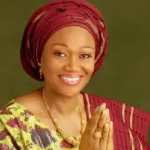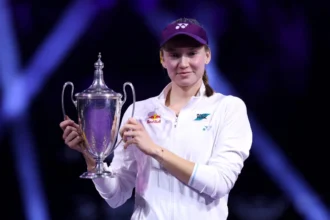By Ernest Osogbue
It was surprising to witness Super Falcons star Michelle Alozie castigate Nigerians over their support for the Super Eagles recently. Alozie was obviously miffed at the capacity crowd that converged on the Godswill Akpabio stadium in Uyo for the crucial 2026 World Cup qualifier between the Super Eagles and the Amavubi’s of Rwanda. In her naivety, she lambasted the fans on social media for not filling up the stadium in like manner when the Super Falcons play.
It was more surprising because Alozie, from her profile, is said to be a cancer researcher, as she targets becoming a medical doctor in the not too distant future. If she had done her research on Nigerian football, she would have realized that supporting the Super Eagles does not mean that you hate the Super Falcons. She must also understand that the relationship between the two is that of a mother and her child. It is true that Super Falcons have 10 WAFCON titles as she rightly observed. It is also true that the Super Eagles or Green Eagles have only 3 AFCON titles to their name. That notwithstanding, it is a known fact that the success of the Super Falcons is an offshoot of the exploits of the Super Eagles. The Super Eagles are Nigeria’s number one brand. Over and above everything in Nigeria, the Super Eagles are the most, if not the only, unifying factor in the country. This fact places the team on a pedestal where it has no competition in the emotions of most Nigerians.
I feel for Alozie because it is clear that she is still very young. Having not grown up in Nigeria and due to the manner in which she became a Super Falcon, she does not understand the growth of football in the country and the significance of the Super Eagles. Long before the advent of women football, the Green Eagles had already been bringing sadness and joy, unity and love, as well as happiness, and stirring the emotions of millions of Nigerians. The team had been engraved in the hearts and minds of Nigerians long before the Super Falcons came to be. This was at a time when Nigerians were despondent and seeking a unifying force. There was nothing like the Super Falcons or women football at that time.
Talking about women football, we must recall that despite the efforts of women to play football in Africa before the 1980s, their desires were vehemently resisted. In fact, up to the 1970s and early 1980s, parents prohibited their male children from playing football, maintaining that it was a sport for the never do well. How much more the female children who were seen as being more delicate. A woman who plays football will never find a man to marry her, the parents would say. It was only in South Africa, where due to apartheid, that women of European ancestry became the first to play football on the continent. This led to the formation of the South Africa Women Football Association, SAWFA, in the 1970s.
The popularity of the game in Nigeria, especially with the exploits of the under age teams from the mid 1980s, suddenly made it impossible to prevent young women who were equally excited about the sport and who supported the male teams from playing the beautiful game. The Kodak U-16 World Cup victory in 1985, the Daman miracle in 1989, and the consistent exploits of the Flying Eagles in the Tesema Cup, which they dominated for years, culminated in the gradual integration of young women into football in Nigeria.
With the FIFA World Cup coming into being in 1930, the FIFA Women World Cup only manifested in 1991. This demonstrates the historical disparity between men and women football. Sometimes, in the 1980s, the Youth Sports Federation of Nigeria, YSFON, put together a group of young women interested in football. This led to the formation of the first women national team, which participated at the first women World Cup, China 1991. Following that giant leap, more women began playing football in the 1990’s despite the stigma. With the support of men women football picked up pace. So much so that in 1998, the Confederation of African Football CAF instituted the first African Women Football Championship, which has now metamorphosed into the Women Africa Cup of Nations, WAFCON, of which Alozie is so proud.
The growth of women football in Nigeria is tied to the success of the men’s teams. It follows, therefore, that without the Super Eagles, there would be no Super Falcons. In that sense, there is no difference between the two teams. The challenge, however, is that in the polarized world that we live in today, where gender issues seem to grab headlines, it becomes politically correct to challenge certain already accepted norms. That is where Alozie is making an error. She must understand that the growth of the Super Falcons can not be divorced from the exploits of the Super Eagles.
With this essay not being a comprehensive history of women football in Africa or in Nigeria, it is important to note that were the iconic voices of radio and television football commentators to rise from their eternal rests, they would wonder what you were talking about if you mentioned women football. Voices like that of Ernest Okonkwo, Sebastian Ofurum, Ishola Folorunsho, and Walter Oyatogun, to name but a few, would be lost for words if you mentioned women football to them. This underscores the fact that women football is still relatively new when compared to the men’s game. Women footballers still idolize male footballers and mostly see them as their idols. Women model their goal celebrations and general attitudes to the game after that of the men. The dressing, jersey designs, and general style of play is a clone of the men’s game. This buttresses the point that the women’s game is not yet completely independent of the men’s game.
As women football develops, however, it is important to note that Nigeria was among the first nations to embrace it in Africa. This greatly impacted the Super Falcons, resulting in their continued dominance on the continent. On the other hand, the Super Eagles have faced more challenges on the continent, resulting in only 3 AFCON titles. A closer look at that record, however, would reveal several silver and bronze medals, more than any other country on the continent. That is why the Super Eagles would always be the darling team of most Nigerians, including women.
As we continue our support for the Super Falcons and as they continue to dominate the African continent, it is important to remember that the target is neither for the Super Falcons to compete with, nor is it for them to displace the Super Eagles, in the emotions of Nigerians. Rather, the object should be to complement it. It is in doing this that the Super Falcons will endear themselves more to Nigerians. Michelle Alozie must, therefore, understand that it is not that Nigerians love the Super Falcons less. It is simply that Nigerians love the Super Eagles more.









